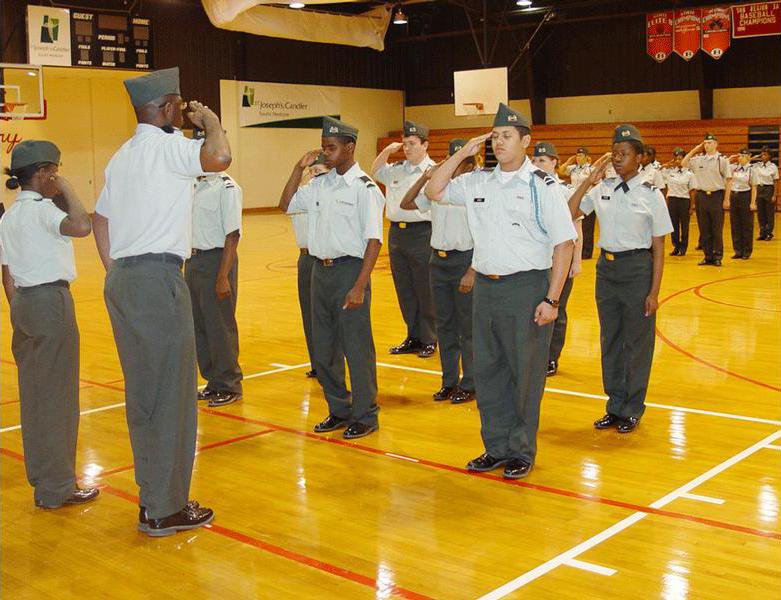Since the Junior Reserve Officers’ Training Corps (JROTC) program was instituted into Bryan County high schools in August of 2004, it has vastly grown in size, popularity and reputation.
Despite a common stereotype, JROTC is not a program that preps students for a military career. Rather, it "is geared to teach young people the skills that are necessary to enable them to be better citizens," according to Chief Warrant Officer 3 Liston Singletary III, who heads the program at BCHS.
"Now, there are a few cadets that do decide to join the military, and, in that case, we try to steer them in the right direction and make sure that what they’re being told by the services is accurate information," Singletary added. "We do not promote a military career but rather empower them with the tools that are necessary so their parents and they can make a more informed decision and ask the right questions so they know exactly what they’re getting into if they choose that route."
"I’ve had many recruiters call me and ask me to join, but I don’t plan on going into the military," said RHHS Cadet Lt. Col. Kelsey Elam. "I’m going to Georgia Southern my first year and then transferring to GCSU. I’m looking at business management in regard to career plans."
So why did Elam join a class that has her dress in military uniform and involves many militaristic procedures?
"It really helps students find themselves," said Elam. "JROTC offers confidence, fitness and learning about other things outside of just regular subjects."
"The main thing that helped me was overpowering my fear of getting in front of people," Elam continued." "With being a Lt. Colonel and being in charge of 140 kids, stage fear is not an option. When you’re out there giving commands and orders, you have to be able to get respect from your fellow cadets. It also helps out with grades. It helps you keep organized. When I first started, all my schoolwork was crammed into one big binder. After applying some of the organizational skills I learned here, I now am more organized in my other classes."
The program seems to be very popular among the students enrolled in it. Students say much of that has to do with the fact that, unlike other high school classes, the curriculum is taught by fellow students.
"I love it," said BCHS Cadet Battalion Commander Cameron Griffin. "This is a class that all students should take. This program has helped prepare me for the future. What other class will you see the students actually teaching courses? The teachers are here to guide. Other than that, we make it happen. We take a lot of pride in that."
It’s not often that you survey high school kids about one of their classes and get feedback with adjectives like "life-changing" and "revolutionary", but those words were reflective of many of the comments from BCHS and RHHS students enrolled in the JROTC programs.
"When I first got into the program, I wasn’t sure what I was going to do with my life," said RHHS Cadet Command Sgt. Major Michael Young. "This program turned me around 180 degrees. It made me the person I am today. It’s not about the military, it’s about leadership. It’s about being a better citizen."
Young heads up the RHHS Raiders' program, which is a JROTC athletic competition that has annual competitions. Young boasts that the RHHS Raiders won third in the nation in this year’s competition. BCHS’s Raiders were successful as well, with their drill team advancing to the state competition.
"I’ve had some of these kids all three years that this program has existed here," said Sgt. Major Charles Bradley, who heads the program at RHHS. "To see where they started from and where they’re at now is really inspiring. We’ve taken individuals who were unsure of themselves and lacked confidence in front of the class to where they are now actually running this program."Two days a week are spent on curriculum, prepared and taught by students. One day is spent in physical training, such as marching. Wednesdays are inspection day.
The rest of the time is spent on what Singletary calls "self esteem building activities".
"This gives them the opportunity to express themselves," explains Singletary. "We let them get creative and let them vent. It’s a very open forum and works as both a form of communication and counseling."
Singletary said this format was therapeutic during the recent tragedy in Pembroke that claimed of lives of three BCHS students, including BCHS JROTC Corporal Heather Arthur.
Both Singletary and Bradley said the cadets participate in many community outreach programs. They also said both programs are geared toward giving their cadets the capability to reach for a higher education.
"We help to expose our students’ talents and strong points and help to guide them in the right direction in regard to further education," said Singletary.
"This JROTC program is one of the best decisions this school (BCHS) has made because our children need to understand at the earliest of ages how to be disciplined, be what they need to be, and do what they got to do," said Jesse France, Arthur’s grandfather.
"It’s sad to say, but a lot of young folks today have no idea what this world is about, how to get a job, or how to present themselves," France said. "We’ve got to have people that are proactive for our next generation and JROTC is helping to promote this idea. These kids (in the program) are hand over fist better off than a lot of adults today because they have focus."

